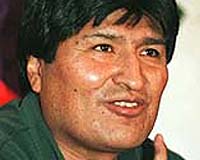| . |  |
. |
Washington (UPI) Aug 7, 2009 Support for Manuel Jose Zelaya is fading fast at the Obama White House because of the ousted Honduran president's track record as a mercurial character whose past conduct has not helped U.S. interests in Latin America, analysts said. Although officials insist the administration is not softening its position on Zelaya returning to power and the United States refuses to recognize the de facto regime of Roberto Micheletti, in power since the June 28 coup, analysts said the administration's enthusiasm for Zelaya's return was waning. Charles Rault, director of ISRIA.com political consultancy and information service, told United Press International Obama might be seeking a third way -- neither backing Zelaya outright nor endorsing the coup -- to extricate the United States from a complex situation created by the untimely coup during the early phase of his overtures to Latin America. As expected, the coup has given a new voice to anti-American rhetoric from Venezuela, Bolivia and Ecuador, Rault said. At the same time, opposition to Zelaya has grown in the U.S. Congress. Rep. Ileana Ros-Lehtinen, R-Fla., called upon Obama to drop his "unabashed support for Zelaya." Richard Lugar, R-Ind., from the Senate Foreign Relations Committee, wrote in a letter that the U.S. "policy and strategy for engagement is not based on supporting any particular politician or individual." U.S. politicians have also noted that the coup was triggered by Zelaya's own provocative actions that polarized Honduran society. Zelaya's proposition to legalize drugs and his drift away from a moderate reformist position have highlighted the stark contrast between his policies as president and concerted U.S. endeavors to beat drug trafficking from Latin America. Honduras lies on the transit route for cocaine between Colombia and the United States. According to Rault, Zelaya's ouster threatened to botch Obama's initiatives to reconcile U.S. differences with Latin American neighbors, as evidenced by a recent upsurge in anti-American pronouncements from countries other than the staunchly anti-American Venezuela. "Zelaya's friendship with Venezuelan leader Hugo Chavez focuses most of U.S. congressmen's discontent," Rault said. "The crisis in Honduras somehow put Chavez and his allies, Bolivian President Evo Morales and Ecuadorean President Rafael Correa (not to mention Cuba's Raul Castro), back on the track of anti-American rhetoric," said Rault. Domestic considerations could sway White House decision-making, Rault said. "Obama wants to succeed in his healthcare reform and he knows that any support from the Congress will be crucial. Supporting Zelaya may encourage the Republicans to close ranks against his main political objective," he said. "With current decline in opinion polls, it could turn disastrous for his ambitious policies at home; especially as some will take advantage of this to denounce weakness in his defense of the U.S. interests abroad," said Rault. "Somehow, I think the United States will choose not to back down officially but to lessen its interest in the matter (at least seemingly), notably to decrease media attention and not to have to answer too many questions that would be left unanswered," he said. "Most likely Washington could plead that finally the ousting of Zelaya resulted from a problem of interpretation and from a decision peculiar to the constitution of Honduras," he said, referring to the Honduran Supreme Court's ruling that declared illegal Zelaya's decision to dismiss the head of the military and precipitated his downfall. The military refused to organize a poll that would have changed the Honduran Constitution and increased Zelaya's time in office. The poll was also opposed by the Honduran Supreme Court and Congress, the attorney general and the supreme electoral tribunal. Rault said Obama's upcoming meetings at the North America summit in Guadalajara could prove decisive in defining the U.S. position on Honduras and, specifically, Zelaya. The president may also seek advice from Brazilian President Luiz Inacio Lula da Silva, Rault said. Zelaya has been campaigning for return to Honduras from exile in Nicaragua and has twice attempted entry, the first time by air. His border assemblies have attracted Honduran supporters from across the border, and loyalist strikes and stoppages have caused millions of dollars of losses to the Honduran economy. The United States has canceled visas for prominent Hondurans associated with the de facto regime, and the European Union has suspended aid to the country. Share This Article With Planet Earth
Related Links Democracy in the 21st century at TerraDaily.com
 Bolivia fears right in Argentina, Chile
Bolivia fears right in Argentina, ChileLa Paz, Bolivia (UPI) Aug 5, 2009 Bolivian President Juan Evo Morales is concerned that recent gains by right-wing political leaders in Argentina and Chile could lead to election wins by fascists and "Pinochetistas" in the two neighboring countries currently ruled by his friends. Morales told a political rally in the capital a right-wing advance in Argentina and Chile in their next elections would be a blow to democracy ... read more |
|
| The content herein, unless otherwise known to be public domain, are Copyright 1995-2009 - SpaceDaily. AFP and UPI Wire Stories are copyright Agence France-Presse and United Press International. ESA Portal Reports are copyright European Space Agency. All NASA sourced material is public domain. Additional copyrights may apply in whole or part to other bona fide parties. Advertising does not imply endorsement,agreement or approval of any opinions, statements or information provided by SpaceDaily on any Web page published or hosted by SpaceDaily. Privacy Statement |